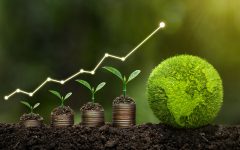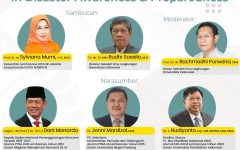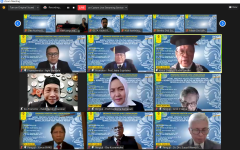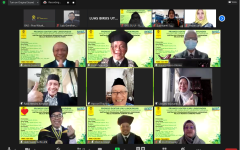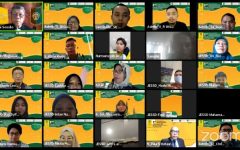Enlivening The 4th Anniversary, School of Environmental Science Universitas Indonesia Held an Online Seminar
August 9, 2023 2024-12-21 17:17Enlivening The 4th Anniversary, School of Environmental Science Universitas Indonesia Held an Online Seminar
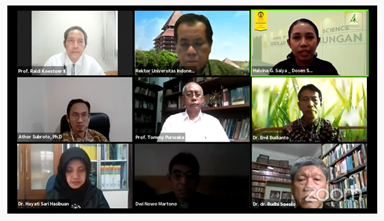
Enlivening The 4th Anniversary, School of Environmental Science Universitas Indonesia Held an Online Seminar
The University of Indonesia School of Environmental Sciences (SIL UI) held an online seminar in the framework of its 4th Anniversary on July 15, 2020 with the theme Sustainable Environmental Management Reform. The seminar began with remarks by the Director of SIL UI, Dr. Emil Budianto. In his remarks, he briefly explained the history of SIL UI starting from the establishment of the Center for Environmental Science Studies (PSIL) in 1979-1982, after which the Postgraduate Faculty was established, then changed its name to the Postgraduate Program which manages students of the Masters Program and Doctoral Program of all faculties at UI. In 2000, monodisciplinary study programs were transferred to the Faculty, while multidisciplinary study programs (including PSIL) remained under the management of the UI Postgraduate Program. The UI Environmental Science Masters and Doctoral Programs continued to develop until the UI School of Environmental Science was officially formed and on July 2, 2020, SIL-UI currently commemorates its 4th Anniversary.
The seminar, which was attended by around 4800 participants virtually through zoom and YouTube streaming, was opened by the Rector of the University of Indonesia for the 2019-2024 period, Prof. Ari Kuncoro, S.E., M.A., Ph.D. He hopes that this seminar can show the contribution of UI, especially SIL, in developing real thoughts and policies for environmental development in Indonesia.

This online seminar was filled by two keynote speakers, Prof. Emil Salim and Dr. Raldi Hendrotoro Koestoer, M.Sc., Ph.D. moderated by the Head of the Master of Environmental Science Study Program, Dr. Hayati Sari Hasibuan. Prof. Emil Salim, in his presentation, emphasized the urgency of education and science as the forerunner of sustainable development. Human civilization is determined by education and the education platform will affect civilization. By emulating the development of science during the time of Caliph Harun Ar-Rashid and Al-Makmun, there are several important points that are missing in the process of civilization building that is developing today. These points are in the form of the goals of development science, including to create divine humans, build people’s welfare so that it is free from poverty and inequality between members of the nation, and educate the community by developing science for humanity and national civilization. So from this explanation it can be concluded that the purpose of science is to be practiced and the practice of knowledge is a form of devotion to God Almighty. This is a provision for SIL and the Indonesian Nation in general to redirect the essence of good development.

Dr. Raldi Hendrotoro Koestoer, M.Sc., Ph.D. as the second speaker explained about environmental management in increasing human resource capacity during the COVID-19 pandemic. This pandemic phenomenon raises various problems, including massive layoffs to reduce production costs. The Coordinating Ministry said that massive layoffs occurred in urban and industrial areas reaching 1.7 million workers. In addition, another problem arising from the COVID-19 pandemic is the increase in waste generation due to the Large-Scale Social Restrictions (PSBB) policy and medical waste. KLHK estimates that infectious waste production will increase by 30 percent during the pandemic. Based on these data, an idea emerged to include an environmental management education program in pre-employment coaching. So that employees who are laid off can be accessed to pre-employment programs that are environmentally friendly education. He also recommended that the concept of environmental friendliness also be developed starting from the family sphere, in order to create environmentally friendly work and school from home activities.
Prof. Tommy Purwaka responded to the presentation of the two keynote speakers to open the discussion with a statement that now we need human resources with character. But what is intriguing at this time is that the character of teachers and lecturers has shifted from educators to employees. This causes the goal of forming human resources with character not to be achieved. Therefore, the reform of sustainable environmental management by human resources with character is expected to continue to be improved.
In closing, Dr. Hayati Sari Hasibuan as the moderator said that this seminar was the first series organized by SIL UI. In the future, there will be regular online seminars held every two weeks by discussing other interesting themes.
(reporter: Kunny)

